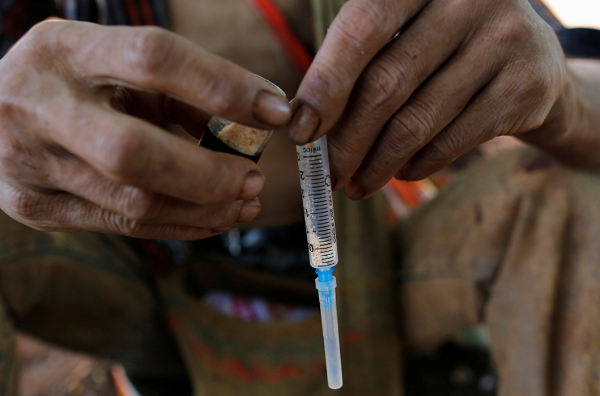Drug Use Statistics Skyrocketed In Last 15 Years

The U.S. is losing more Americans lives to drugs every year than it did in the Vietnam war, the latest government figures show.
The number of heroin users spiked 230 percent from 404,000 users in 2002 to 948,000 in 2016, according to a new report by the Substance Abuse and Mental Health Services Administration. Meanwhile, the number of heroin deaths has increased by 630 percent, from 2,089 in 2002 to an estimated 13,219 in 2016, according to the data from the Centers for Disease Control and Prevention.
The U.S. saw more than 50,000 drug overdose deaths in 2015 --most of them related to opioids -- which is about the same number of Americans lost in the Vietnam war.
“We are losing a Vietnam War to drug overdose every year,” said Health and Human Services Secretary Tom Price, who was part of a panel that released SAMHSA’s 2016 National Survey on Drug Use and Health on Thursday. “The opioid crisis, as you all know, is taking a bigger and bigger toll every year—each year, a new unprecedented level of lives lost.”
Data from the CDC suggest the number of deaths surpassed 60,000 in 2016 and could continue its trend this year. The report found 11.8 million people nationwide misused opioids last year, with 11.5 million misusing prescribed opioids, including Hydrocodone, Fentanyl, Oxycodone.
“Heroin is less expensive than prescription opioids, partially explaining the increase in heroin use,” Sebastian Seiguer, CEO of emocha, told International Business Times.
Emocha teamed up with Johns Hopkins and the CDC to develop an app to make sure people take their medications and tries to prevent opioid addiction.
“Successful models to reduce addiction and overdoses already exist," said Seiguer. "Vermont is the perfect example of how public health experts deployed funding to set up a sophisticated, effective infrastructure for treatment delivery that dramatically reduced overdose deaths and addiction in their state.”
The report comes after President Donald Trump declared the opioid epidemic a national emergency in July.
“Declaring the opioid epidemic a national crisis is an important first step, but ensuring that public health professionals receive adequate resources to meet the challenge is urgent,” said Seiguer. “Local public health departments and municipalities need support as they develop and implement programs and systems that identify those at risk, get them into treatment, and support their recovery.”
Mental Health
Beside the new numbers on opioids, the experts also found there are 10 million people overall in the U.S. with a serious mental illness. Those mental issues include schizophrenia, bipolar disorder and severe depression. The report's survey found the rate of young Americans (ages 18-25) with a serious mental illness has continued to increase for that past several years. Alarmingly, this year’s rates exceeded the figures among older Americans for the first time.
“This survey reflects the urgency we have in two of the clinical priorities we’ve set forth: the opioid crisis and serious mental illness,” said Price.
The report said about one third of American with serious mental illness received no treatment in the past year.
“We know how to treat these diseases—failing to provide treatment is a serious indictment of our current policies,” said Price. “It would be like letting one-third of Americans with cancer or heart disease go without treatment.”
The report said 8.2 million Americans over the age of 18 had a substance use disorder and a mental illness.
A separate study in June by Dartmouth-Hitchcock and the University of Michigan found 51 percent of all opioid medications distributed across the nation each year are prescribed to adults with mental illness.
“To some degree it was alarming because people with mental disorders have a higher risk of abusing opioids,” Matthew Davis, co-author of the study and assistant professor at the University of Michigan School of Nursing, told International Business Times in June. “It’s definitely a population to look at more closely in the future."
© Copyright IBTimes 2024. All rights reserved.





















